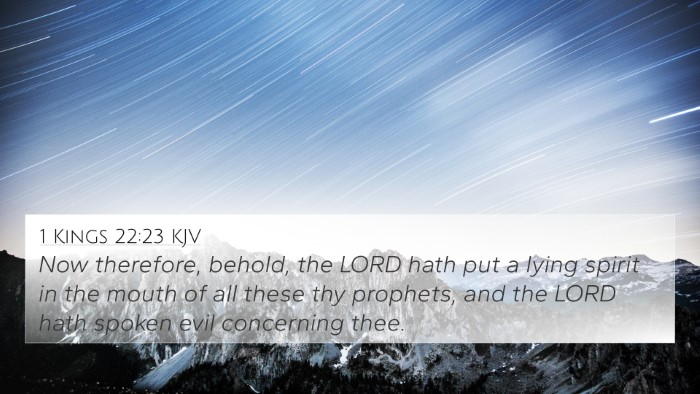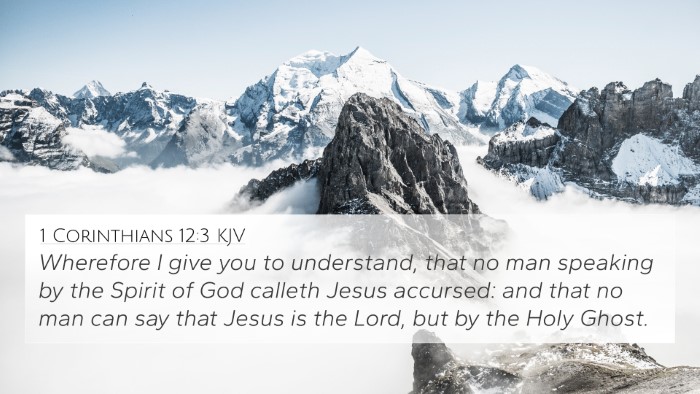Old Testament
Genesis Exodus Leviticus Numbers Deuteronomy Joshua Judges Ruth 1 Samuel 2 Samuel 1 Kings 2 Kings 1 Chronicles 2 Chronicles Ezra Nehemiah Esther Job Psalms Proverbs Ecclesiastes Song of Solomon Isaiah Jeremiah Lamentations Ezekiel Daniel Hosea Joel Amos Obadiah Jonah Micah Nahum Habakkuk Zephaniah Haggai Zechariah MalachiJob 26:4 Similar Verses
Job 26:4 Cross References
To whom hast thou uttered words? and whose spirit came from thee?
Uncover the Rich Themes and Topics of This Bible Verse
Listed below are the Bible themes associated with Job 26:4. We invite you to explore each theme to gain deeper insights into the Scriptures.
Job 26:4 Cross Reference Verses
This section features a detailed cross-reference designed to enrich your understanding of the Scriptures. Below, you will find carefully selected verses that echo the themes and teachings related to Job 26:4 KJV. Click on any image to explore detailed analyses of related Bible verses and uncover deeper theological insights.

1 Kings 22:23 (KJV) »
Now therefore, behold, the LORD hath put a lying spirit in the mouth of all these thy prophets, and the LORD hath spoken evil concerning thee.

Job 20:3 (KJV) »
I have heard the check of my reproach, and the spirit of my understanding causeth me to answer.

Ecclesiastes 12:7 (KJV) »
Then shall the dust return to the earth as it was: and the spirit shall return unto God who gave it.

1 Corinthians 12:3 (KJV) »
Wherefore I give you to understand, that no man speaking by the Spirit of God calleth Jesus accursed: and that no man can say that Jesus is the Lord, but by the Holy Ghost.

1 John 4:1 (KJV) »
Beloved, believe not every spirit, but try the spirits whether they are of God: because many false prophets are gone out into the world.

Revelation 16:13 (KJV) »
And I saw three unclean spirits like frogs come out of the mouth of the dragon, and out of the mouth of the beast, and out of the mouth of the false prophet.
Job 26:4 Verse Analysis and Similar Verses
Understanding Job 26:4
Job 26:4 states, "To whom have you uttered words? And whose spirit came from you?" This verse emerges from a longer discourse where Job responds to the words of his friend Bildad, accentuating Job's integrity and his understanding of divine wisdom. This passage highlights the intricacies of divine communication and the profound wisdom inherent in God’s creation, which can often be overlooked by human beings. Here, we delve into various interpretations and meanings of this verse, utilizing insights from renowned public domain commentaries by Matthew Henry, Albert Barnes, and Adam Clarke.
Commentary Insights
Matthew Henry's Commentary
Matthew Henry emphasizes that Job is asking his friends the source of their wisdom. He implies that true wisdom originates from God alone and that human beings should be cautious when claiming to speak on divine matters. This verse serves as a reminder of the limitations of human understanding compared to the infinite wisdom of God. Henry suggests that Job is positioning himself in contrast to his friends, asserting that their words lack the depth and truth that come from divine insight.
Albert Barnes' Notes
Albert Barnes provides a thorough exploration of the rhetorical questions posed by Job in this verse. He points out that Job’s inquiry into the spirit behind their words suggests he is questioning their authority and understanding. Barnes emphasizes that God's spirit is the ultimate source of knowledge and truth. This aligns with the overarching theme in Job, where human arguments must bow to divine wisdom. He further links this verse to the necessity of humility in the pursuit of truth.
Adam Clarke's Commentary
Adam Clarke extends the discussion by highlighting the significance of the spirit mentioned in the verse. He interprets the "spirit" as the essence of wisdom that, according to Clarke, can only come from God. He reflects on the implications of human speech and the responsibility that comes with expressing divine truths. Clarke’s analysis stresses that Job is not only defending his position but is also challenging his friends to rethink their understanding of God and His creation.
Cross-References to Job 26:4
This verse finds connections with several other Bible verses that enhance its meaning and provide a broader context. Here are some notable cross-references:
- Proverbs 2:6: "For the Lord gives wisdom; from his mouth come knowledge and understanding."
- James 1:5: "If any of you lacks wisdom, let him ask of God, who gives to all liberally and without reproach, and it will be given to him."
- 1 Corinthians 2:13: "Which things we also speak, not in the words which man’s wisdom teaches but which the Holy Ghost teaches; comparing spiritual things with spiritual."
- Job 12:13: "With God is wisdom and strength; he has counsel and understanding."
- Isaiah 40:13-14: "Who has directed the Spirit of the Lord, or as His counselor has taught Him?"
- John 3:34: "For he whom God has sent speaks the words of God: for God gives not the Spirit by measure unto him."
- Romans 11:33: "Oh, the depth of the riches of the wisdom and knowledge of God! How unsearchable his judgments, and his paths beyond tracing out!"
Thematic Connections
The theme of divine wisdom versus human understanding is prevalent throughout the Scriptures. Job 26:4 invites readers to reflect on how often human beings presume to speak on God's behalf without recognizing the profound depth of His wisdom. This leads to a broader exploration of the means by which we can seek to understand Scripture, taking into account the methods of cross-referencing Biblical texts to uncover deeper truths.
Tools for Bible Cross-Referencing
To dive deeper into the connections within the Scriptures, consider using tools such as a Bible concordance, which can help identify related verses and facilitate a comparative Bible verse analysis. A Bible cross-reference guide can also be invaluable in engaging with themes and narratives that run parallel across different books of the Bible.
Conclusion
Job 26:4 serves as a potent reminder of the limitations of human wisdom when placed against the backdrop of divine understanding. The reflections from public domain commentaries elucidate the significance of this verse in the larger narrative of Job, prompting believers to delve into the wondrous depths of God's wisdom and the spirit from which all true understanding arises. By employing cross-referencing methods, one can gain a richer appreciation for the interconnectedness of Scripture and the profound themes that echo throughout it.



